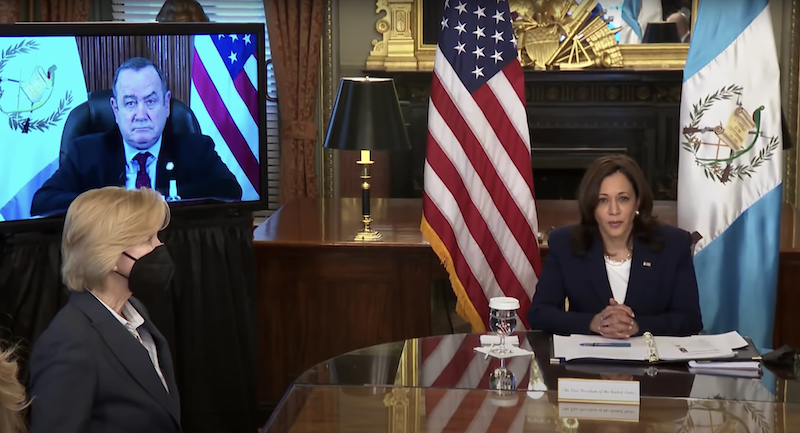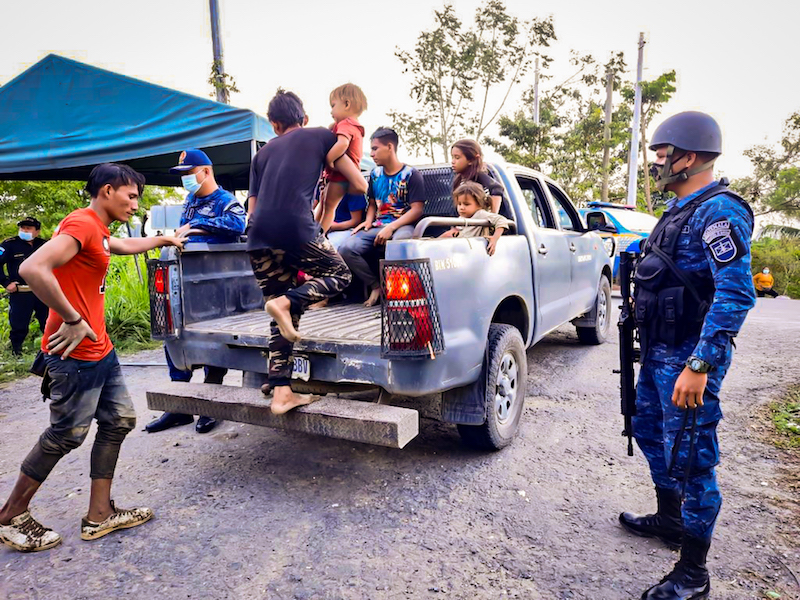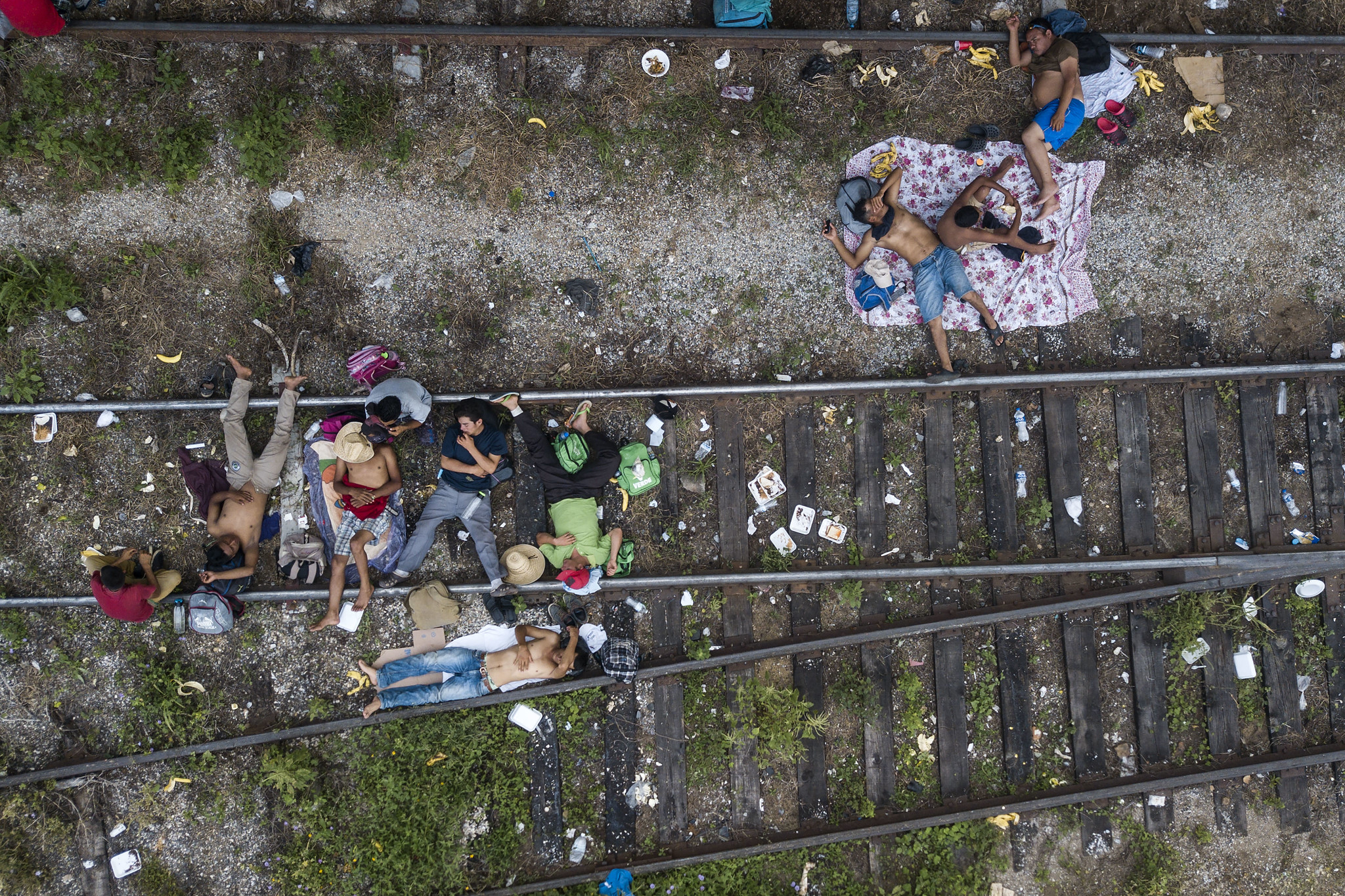Following a virtual bilateral meeting with Guatemalan President Alejandro Giammattei, Vice President Kamala Harris announced a $310 million humanitarian aid package to Central America and Guatemalan Foreign Minister Pedro Brolo announced an agreement with the U.S. to establish a new joint border protection task force that would include 16 Department of Homeland Security officials. Two weeks after Harris’s first phone call with Giammattei and Mexican President Andres Manuel Lopez Obrador in late March, the Biden Administration began to militarize Mexico and Central America with proxy forces on their shared borders, including the deployment of 10,000 Mexican troops on its border with Guatemala, 1,500 Guatemalan troops on its border with Honduras and a “surge” of 7,000 troops within Honduras.
While humanitarian aid is desperately needed, beefing up security forces in Central America while cozying up to authoritarian leaders will only exacerbate the criminality and corruption pushing so many families and youth to seek safe haven in the United States. Shadowy relations between police, judiciary, cartels, organized crime and gangs fuse daily life with fear while also facilitating illegal migration through trafficking networks. To stem migration from Central America, we need an internationally supported commission to investigate and prosecute corruption throughout the region – not a U.S. led working group on corruption that is currently under consideration. The U.S. must carefully choose its institutional partners in this quest.
Related → ‘Denial,’ from the Holocaust to the Guatemalan Genocide
In March, the U.S. ratified an agreement for $530,000 in U.S. assistance to Giammattei’s Presidential Commission against Corruption. Within one week, Guatemalan rights to freedom of assembly were suspended in five departments near the Honduran border. Following a similar decree in January, Guatemalan police and army soldiers attacked a group of Honduran families with tear gas and batons at a checkpoint. On March 30, a Mexican soldier killed a Guatemalan at a border checkpoint following on the heels of the recent repatriation of 13 Guatemalans killed by Mexican police near the U.S. border.
Like the March 2021 contribution to Giammattei’s Commission, more aid to the Giammattei government will not slow the exodus of Guatemalans or make a dent in the struggle against corruption. In 2012, Giammattei was arrested for his role as national prison director in the 2006 Pavon prison massacre – categorized as a series of planned extrajudicial executions by the U.N. backed International Commission Against Impunity (CICIG). After charges were dropped, Giammattei ran for president promoting the massacre as his “successful” retaking of the prison. Giammattei won his fourth campaign for president in 2019 after the leading candidate, former Attorney General and anti-corruption crusader Thelma Aldana, was driven into exile. In February 2021, Aldana posted “I am afraid of going back to Guatemala and being killed,” on #TengoMiedo (#IAmAfraid) – the Guatemalan Twitter campaign against gender violence. Granted political asylum in the U.S., Aldana joins her predecessor in exile, former Attorney General Claudia Paz y Paz, who led successful anti-corruption cases with CICIG as well as securing convictions of army officers involved in the genocide of the 1980s.

Giammattei claims Guatemala no longer needs international presence for prosecutors to safely do their jobs. But if this were true, the two top corruption fighters Aldana and Paz y Paz would not be in exile, and the current attorney general would not be using the power of her office to file specious charges against the very prosecutor’s unit meant to investigate corruption. Most recently, anti-corruption crusader and elected Judge Gloria Porras was denied her seat on the Constitutional Court by a murky legal challenge stripping the court of its independence and leaving judges vulnerable to the whims of the powerful.
Whether attorneys general seeking to prosecute corruption or regular citizens trying to take a bus to work without having to pay a “tax” to the local gang, rule of law is essential for Guatemalan society to give its citizens a measure of security. Corruption drives legal and illegal migration because it collapses public space and civic possibility. Migration from Guatemala went down 35% during CICIG’s first year of anti-corruption work in Guatemala. For five years, the number of Guatemalans apprehended at the U.S. border continued to drop. CICIG’s successes are a model for the region to follow to fight against corruption.
Giammattei’s anti-corruption commission is the latest in a long trail of presidential Ponzi schemes in Guatemala. Former President Otto Perez Molina, a former general, utilized the office of the presidency to establish his own import tax system. Called La Línea, The Line, the $120 million stolen from customs coffers was part of the $535 million lost to corruption in 2015. The indictment of Perez Molina and other high-ranking officials revealed the complex arrangements that tie politicians to security structures, cartels, organized crime and the private sector. Guatemalans overwhelmingly supported CICIG because it offered a glimpse of how rule of law could break the chokehold of grifters and clandestine organizations on the state. While Guatemalan migration spiked during the first two years of Perez Molina’s crooked regime, the number of Guatemalans at our southern border decreased by 29% when Perez Molina was arrested on corruption charges in 2015.

While disliked by the powerful and the corrupt, CICIG had a 75% approval rating in Guatemala. Working with Guatemalan prosecutors, more than 70 criminal networks were dismantled, 100 high impact cases were investigated and prosecuted, 600 suspects were brought to trial and 400 were convicted. CICIG prosecutions supported Guatemalan prosecutors and made it possible for regular citizens to access justice. As the powerful and corrupt ramped up unrelenting attacks on CICIG and the previous U.S. administration was silent, then-President Jimmy Morales, who was himself under investigation, did not renew CICIG’s mandate in 2019, and a record 264,168 Guatemalans were caught on the border.
Corruption is the source of increasing inequality, diminished life possibilities, hunger and violence that drive migration. If you follow the money, trafficking and organized crime implicate transnational criminal actors, but also implicate failed U.S. government policies and inadequate support for regional and international efforts to combat corruption and impunity. The U.S. government provided an average of $4 million annually to CICIG over 12 years – a paltry sum compared to the $60 million spent weekly to shelter unaccompanied minors at the border.
Support for access to education, economic growth, expanding labor opportunities and enhancing democracy are benchmarks for U.S. international aid programs, but they cannot flourish in corrupt Central American states. Vice President Harris can address the root causes of migration and re-establish U.S. priorities of strengthening human rights, rule of law and democracy by working with the United Nations and the Organization of American States to reboot CICIG as an independent regional commission against impunity empowered to investigate and prosecute corruption and criminality in Guatemala, El Salvador and Honduras.
(The opinions expressed here are those of the author)
Barriozona Magazine’s Database of Missing Migrants from Central America (In Spanish)
Related video: Vice President Harris Hosts Guatemalan President Alejandro Giammattei for a Virtual Bilateral Meeting
© 2021 - 2024, Victoria Sanford. All rights reserved.





